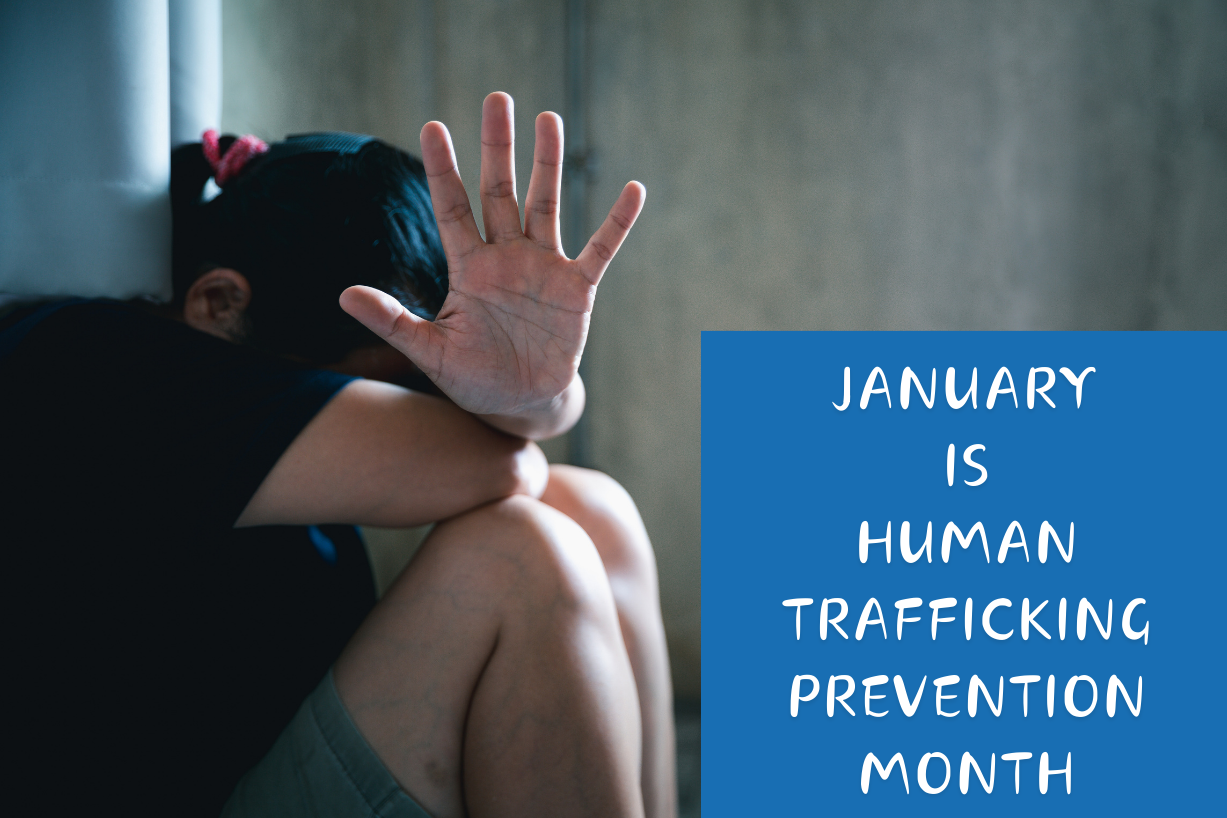January is Human Trafficking Prevention Month, a presidentially designated observance designed to educate the public about human trafficking and the role they can play in preventing and responding to human trafficking. National Human Trafficking Prevention Month is an opportunity to raise awareness and provide education on how to prevent and respond to the issue of human trafficking. In addition, Human Trafficking Awareness Day/Wear Blue Day is Jan. 11th.
Human trafficking is a public health issue and crime that affects individuals, families, and communities across generations, exploiting the most vulnerable among us and weakening our collective well-being. Human trafficking, as defined by the Trafficking Victims Protection Act, is a commercial sex act induced by force, fraud, or coercion or when a person induced to perform such an act is not yet 18 years old; or the recruitment, harboring, transportation, provision, or obtaining of a person for labor or services, through the use of force, fraud, or coercion for the purpose of subjection to involuntary servitude, peonage, debt bondage, or slavery.
An estimated 27.6 million people are subjected to human trafficking globally, including cases of human trafficking reported in every state and territory across the United States. Human trafficking can happen to anyone, but certain populations are disproportionately at risk, including people affected by prior abuse or sexual violence, poverty, unstable living situations or homelessness, as well as those systemically marginalized and underserved. People may be trafficked in person or on-line; in industries such as restaurants, cleaning services, construction, factories, and by strangers or someone they know, including partners, parents, and other family members.
The good news is Human trafficking is preventable by building individual, community, and societal understanding and resilience, reducing social inequities, and addressing social determinants of health. Human trafficking requires a coordinated, community-wide response. Helping agencies are encouraged to form diverse partnerships to comprehensively address human trafficking.
Prevent Child Abuse Indiana (PCAIN) is dedicated to ensuring those impacted by human trafficking can receive person-centered, trauma-informed, and culturally and linguistically appropriate care. During National Human Trafficking Prevention Month, PCAIN encourages everyone to visit the Administration of Children & Families website and www.humantraffickinghotline.org to learn more about human trafficking and ways they can help.
The National Human Trafficking Hotline can be accessed by calling 1-888-373-7888, by texting 233733 (BEFREE), or by Live Chat using| TTY: 711. The National Human Trafficking Hotline connects people at risk or who have experienced human trafficking with critical support services that help them stay safe. People can connect with a trained advocate for support, safety planning, crisis intervention, and urgent and nonurgent referrals. The confidential toll-free phone, text line, and online chat are available from anywhere in the United States, 24 hours a day, 7 days a week. Help is available in English, Spanish, and in more than two hundred additional languages through an on-call interpreter.
Please share the following link for this informational video about Human Trafficking with your colleagues, family, and friends to educate them on Human Trafficking and dispel common misunderstandings: https://youtu.be/35uM5VMrZas
Indiana Coalition to End Sexual Assault & Human Trafficking is an agency dedicated to education and advocacy. Please visit www.ICESAHT.ORG for Human Trafficking Awareness Month activities such as:
- Human Trafficking Awareness Day at the Statehouse Jan. 16th
- Virtual Human Trafficking Awareness Conference Jan. 23rd-24th
PCAIN also offers educational presentations throughout the year on the subject of Human Trafficking (HT101) and Teen Healthy Relationship Awareness (WWID). Request a presentation at www.pcain.org.
PCAIN is an active partner with IPATH (Indiana Protection for Abused and Trafficked Humans), a taskforce of Social Service and Healthcare agencies dedicated to educating the public on the issues of local Human Trafficking and assist those targeted by Human Trafficking. To be trained on the What Would I Do Curriculum or join the IPATH Team, contact Darcy Wade, WWID Director & Development Partner Trafficking Prevention Specialist 317-840-6545 youthcurriculum.ipath@gmail.com Instagram: WWID.Youth Facebook: What Would I Do? A Trafficking Prevention Curriculum
Sources:
U.S. DEPARTMENT OF HEALTH AND HUMAN SERVICES HUMAN TRAFFICKING PREVENTION MONTH TOOLKIT
ICESAHT.ORG

